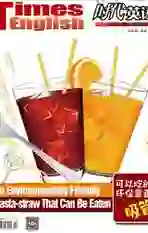回收垃圾出奇招:印尼推出“塑料公交车”
2020-06-19
Dozens of people clutching bags full of plastic bottles and disposable cups queue at a busy bus terminal in the Indonesian city of Surabaya—where passengers can swap trash for travel tickets.
在印度尼西亚泗水市一个繁忙的公交终点站,数十名乘客手持装满塑料瓶和一次性杯子的袋子在排队,他们可以用垃圾换取车票。
The nation is the worlds second-biggest marine polluter and has pledged to reduce plastic waste in its waters some 70 percent by 2025 by boosting recycling, raising public awareness, and curbing usage.
印尼是全球第二大海洋污染国,该国承诺到2025年,通过加强回收利用、提高公众意识和限制使用,将其水域的塑料垃圾减少约70%。
The “Surabaya” Scheme has been a hit in the city of 2.9 million, with nearly 16,000 passengers trading trash for free travel each week, according to authorities.
印尼有关部门称,“泗水计划”在这座290万人口的城市大受欢迎,每周有近1.6万名乘客用垃圾换车票。
“This is a very smart solution. Travel tickets can be in exchange for free and instead of throwing away bottles people now collect them and bring them here,” explains 48-year-old resident Fransiska Nugrahepi.
“这是一个非常聪明的解决方案。车票可以免费换取,现在人们不再把瓶子扔掉,而是把它们收集起来带到公交站。”48岁的居民弗朗西斯卡·努哈何比解释说。
An hour-long bus ride with unlimited stops costs 3 large bottles, 5 medium bottles or 10 plastic cups. But they must be cleaned and cannot be squashed.
一小时不限站的巴士车程票需要用3个大瓶子、5个中号瓶子或10个塑料杯来换取。但瓶子必须被清洗,且不能被压扁。
Franki Yuanus, a Surabaya transport official, says the programme aims not only to cut waste but also to tackle traffic congestion by encouraging people to switch to public transit.
泗水交通官员弗兰基·元努斯表示,该项目不仅为了减少浪费,还为了鼓励人们乘坐公共交通,以解决交通拥堵问题。
“There has been a good response from the public,” insists Yuanus, adding, “Paying with plastic is one of the things that has made people enthusiastic because up until now, plastic waste was just seen as useless.”
元努斯补充强调:“公众反响不错。用塑料瓶付款是让人们热情高涨的原因之一,因为在此之前,人们认为塑料垃圾毫无用处。”
Currently, the fleet consists of 20 near-new buses, each with recycling bins and ticket officers who roam the aisles to collect any left over bottles.
目前,車队由20辆几乎全新的巴士组成,每辆巴士都配有回收箱和检票员,检票员会在车厢过道里来回走动,收集剩余的瓶子。
Authorities said roughly six tons of plastic rubbish are collected from passengers each month before being auctioned to recycling companies.
有关部门表示,每月能从乘客那里收集到大约6吨塑料垃圾,之后会将垃圾卖给回收公司。
Nurhayati Anwar, who uses the bus about once a week with her three-year-old son, said the trash swap programme is changing how people see their throw-away cups and bottles.
努尔哈亚蒂·安瓦尔和她三岁的儿子大约每周乘坐一次公交车。她说,垃圾换车票项目正在改变人们对一次性杯子和瓶子的看法。
“Now people in the office or at home are trying to collect rubbish instead of just throwing it away,” the 44-year-old accountant told AFP after trading in several bottles for a free ride.
在用几个瓶子换取了一张车票后,这位44岁的会计师对法新社说:“现在人们在办公室或家里都在收集垃圾,而不是直接把垃圾扔掉。”
“We now know that plastic is not good for the environment—people in Surabaya are starting to be aware of it.”
“我们现在知道塑料不环保,泗水的人们开始意识到这一点。”
Other parts of Indonesia are also trying to tackle the issue.
印度尼西亚的其他地区也在努力解决这个问题。
Bali is phasing in a ban on single-use plastic straws and bags to rid the popular holiday island of waste choking its waterways, while authorities in the capital Jakarta are considering a similar by law to rid the city of plastic shopping bags.
巴厘岛正逐步禁止使用一次性塑料吸管和塑料袋,以清除这个度假胜地岛屿上堵塞水道的垃圾。与此同时,首都雅加达的有关部门也在考虑制定类似的法规,以清除该市的塑料购物袋。
Governments around the world are increasingly taking measures to curb the menace of disposable plastic.
世界各国政府都正在采取越来越多的措施遏制一次性塑料的威胁。
A report by the Ellen MacArthur Foundation in 2016 warned there would be more plastic than fish, by weight, in the seas by 2050.
艾伦·麦克阿瑟基金会2016年的一份报告警告称,到2050年,海洋中塑料的重量将超过鱼类。
It is estimated eight million tonnes of plastics enter oceans annually.
据估计,每年有800万吨塑料进入海洋。
It added, “This is equivalent to dumping the contents of one garbage truck into the ocean every minute. If no action is taken, this is expected to increase to two per minute by 2030 and four per minute by 2050.”
該基金会还表示:“这相当于每分钟向海洋倾倒一辆垃圾车的塑料。如果不采取行动,预计到2030年,这一数字将增至每分钟2辆,到2050年将增至每分钟4辆。
Word Study
pledge /pled?/ v. 保证给予;正式承诺
curb /k??b/ v. 抑制,控制,限定,约束(不好的事物)
He needs to learn to curb his temper.
roam /r??m/ v. 徜徉;闲逛;漫步
rid /r?d/ v. 使摆脱
menace /'men?s/ n. 威胁;危险的人(或物体)
